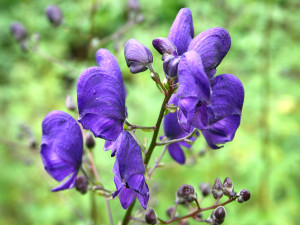Aconitum Napellus is a plant. The root is used for medicine. However, aconite contains some poisonous chemicals. In Hong Kong, aconite is the most common cause of severe poisoning from herbs. In Asia, toxicity is usually related to the use of aconite in traditional medicines. In western countries, aconite poisoning is usually associated with consuming the plant.
Contents
Uses
- Despite serious concerns about safety, some people take aconite by mouth for facial paralysis, joint pain, gout, finger numbness, cold hands and feet, inflammation, painful breathing and fluid in the space surrounding the lungs (pleurisy), certain heart problems (pericarditis sicca), fever, skin diseases, and hair loss. Aconite is also used as a disinfectant, to treat wounds, and to promote sweating.
Benefits
- Pain Reliever: Perhaps the most well-known and trusted use of aconite is as an analgesic. In the same way that even touching the flowers can cause your fingers to become numb, due to the strong anesthetic properties of the organic compounds in the petals, consuming aconite supplements or herbal remedies can relieve pain throughout the body, both internally and externally. This has made aconite a popular alternative remedy for people suffering from chronic conditions and long-term pain. In fact, aconite has been found to be more effective in certain cases than morphine, particularly once morphine sensitivity has developed, and can provide a welcome relief to those patients.
- Anti-Inflammatory Effects: Closely related to the analgesic nature of this unusual plant are its anti-inflammatoryproperties. It is able to numb certain areas of the body that may have become inflamed and the active ingredients and compounds can quickly relieve swelling and stress in aching joints and bones. This makes aconite a very popular treatment for gout, arthritis, and other chronic inflammatory conditions.
- Labor Pains: For women who choose not to use epidurals or other pharmaceutical pain relievers during the often painful birthing process, small amounts of aconite have been used throughout history to relieve labor pains and reduce inflammation, easing the birthing process and increasing chances of ending up with a healthy mother and infant.
- Anxiety and Tension Reliever: Small doses of aconite have been found to be effective for relieving stress and anxiety. While those conditions are often associated with psychological issues or mental pressures, the soothing and anti-inflammatory nature of aconite can help your body and mind relax, lowering the amount of stress hormones in the body, particularly if you suffer from chronic anxiety or tension.
- Nervous System Disorders: There are a number of nervous system disorders for which treatment is still somewhat vague and unsuccessful. The compounds found in aconite directly impact the central nervous system, numbing nerve pathways and eliminating inflammation that can cause these disorders.
- Immune System Function: Although the direct pathway for this treatment is not fully understood, there has been a significant connection between the use of aconite and improved immune function. For this reason, people often turn to aconite when they first feel the onset of the cold and flu, as it can quickly eliminate those symptoms before they become a full-blown illness.
- Fever Reducer: If you are suffering from a fever, aconite is a perfect choice for an alternative treatment, as it can induce sweating, effectively “breaking” the fever and getting you back on the road to recovery. Combined with the above-mentioned effects on the immune system, aconite works as a comprehensive treatment for the common cold and the flu bug that seems to come around each year.
- Heart Palpitations: For those suffering from heart conditions that cause irregular heartbeats or high blood pressure, aconite has been shown to be a truly beneficial treatment. Its ability to slow the heart rate and lower blood pressure allows the heart time to regulate itself and not suffer from the effects of inflammation in the arteries and blood vessels, thus allowing a smooth flow of blood and appropriate function of the heart.
- Sleep Aid: Due to its soothing, numbing, and analgesic properties, combined with its ability to relieve mental and physical stress, aconite has been suggested as a sleep aid for generations. If you suffer from insomnia or restlessness, small doses of aconite can help to ensure that you get high-quality, restful sleep and wake up feeling refreshed and pain-free.
- Detoxify the Body: Aconite’s active ingredients and organic compounds also impact the frequency with which we urinate, stimulating the release of toxins, excess fats, water, and salt from our body, lowering the stress on our kidneys and helping us improve our overall health by eliminating those unnecessary substances.
- Headache Relief: If you suffer from chronic headaches or severe migraines, aconite might be the remedy you’ve been looking for. Whether applied externally or consumed, aconite can quickly relieve tension and pain, just as modern pain relievers promise to do.
Cautions
Interactions
- We currently have no information for Aconitum Napellus Interactions
Other names
Aconit, Aconiti Tuber, Acónito, Aconitum, Aconitum Angustifolium, Aconitum napellus, Aconitum carmichaeli, Aconitum kusnezoffi, Atis, Ativisha, Autumn Monkshood, Bachnag, Bikhma, Blue Monkshood Root, Caowu, Chuanwu, Chuan-wu, Fu Zi, Futzu, Helmet Flower, Monkshood, Monkshood Tuber, Prativisha, Radix Aconiti, Radix Aconiti Kusnezoffii, Radix Aconiti Lateralis Preparata, Vachnag, Vatsnabh, Visha, Wild Aconitum, Wolfsbane, Wutou
References
Source: WebMD, http://www.webmd.com/vitamins-supplements/ingredientmono-609-aconite.aspx?activeingredientid=609&activeingredientname=aconite
Organic Facts, https://www.organicfacts.net/health-benefits/herbs-and-spices/aconite.html


Excellent note about Aconite Nap. Dr Tahir B Mirza